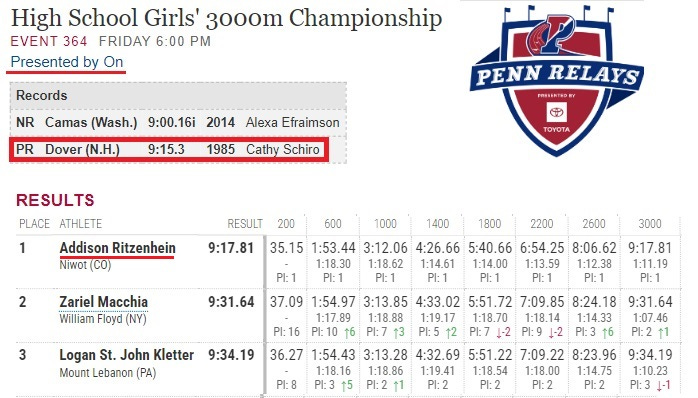A small collection of 2024 Penn Relays notes, video links, and whispered sidebars
Should we in effect be paying high-school kids to be athletes, or should we be shoving our wallets back into our pockets and angrily demanding that these whippersnappers get paper routes instead?
The Penn Relays were held in the remaining serviceable portions of Philadelphia over the weekend (results). The meet provided some boisterous drama even for a multi-day festival of counterclockwise locomotion boasting approximately sixteen million unique interactions within the relay zones of the track at Franklin Field, a revered facility soon to be used as a campground by good protesters on both sides and henceforth ruled antisemitic.
A meet record was set in the Championship of America women's 4 × 800-meter relay. Providence College and the University of Washington were in a two-team battle for the win and the record in the final 100 meters of the race when one of the two anchor-leg runners relaxed her arms more than she intended to and paid a devastating price.
The Championship of America boys’ 4 × 800-meter relay also qualified as an instant classic that left one team, and one runner in particular, unusually devastated even given the number of witnesses.
A preliminary heat of the boys’ 4 × 400-meter relay also included both a fall to the track and a jubilant comeback victory, only in this case both events befell members of the same relay team. Quincy Wilson is essentially the 400-meter equivalent of a 3:55 16-year-old miler, and he has also run a 1:50 800 meters this season.
Finally, Addison Ritzenhein, a sophomore at Niwot High School in Colorado and the 2023 Nike Cross Nationals champion, just missed Cathy Schiro’s 1985 Penn Relays record the High School Girls’ 3,000-meter championship race. Running alone in the lead after a quick opening half-lap, Ritzenhein settled in, then ran each of her last five laps faster than she’d run the previous one.
Schiro is known to old-timers as a genuine pioneer in women’s running. She finished ninth in the inaugural U.S. Olympic Marathon Team Trials for women in 1984 as a sixteen-year-old high-school junior, briefly holding fourth place near the 40K mark. And the 1984 Foot Locker Nationals champion who was predicted to dominate collegiate cross-country instead quit the University of Oregon distance program to do what she had wanted to do all along—excel at the marathon. Schiro (as Cathy O’Brien) made the 1988 and 1992 U.S. Olympic teams in that event.
Ritzenhein, who has already run a 4:44 high-altitude 1,600 meters this season, is also proving to be a trail-blazing teenaged American distance gal. Perhaps more relevant to her career than even an 8:59 at the Penn Relays would have been was her signing a “Name, Image, Likeness” (NIL) deal last week with On—also a major sponsor of this year’s Penn Relays.
I was unaware until learning about Ritzenhein’s deal that high-school athletes were even eligible for NIL money. But in this case, Ritzenhein stands to earn money for promoting products made by the same company that already pays her father to coach On’s stable of professional distance runners. While there’s nothing illegal or unethical about this arrangement, something about it is nevertheless redolent of athletic incest. Maybe I’m skeptical of anything that even remotely ties income to Internet-based self-branding in a high-school sophomore athlete, be that athlete male, female, or deluded. Or maybe I’m too quick to remember that Dathan Ritzenhein’s career with the Nike Oregon Project ended with an IV in Ritz’s arm, an event that also triggered the suspension of Alberto Salazar from the sport but one Ritz himself escaped reputationally unscathed.
This text is here only to help readers visually distinguish the end of the above bulleted list from the noncontributory remarks made between that list and the part of the post people see moments before shaking their heads and either deleting an e-mail or closing a browser tab. And this sentence exists solely to provide a short, abrupt conclusion.


